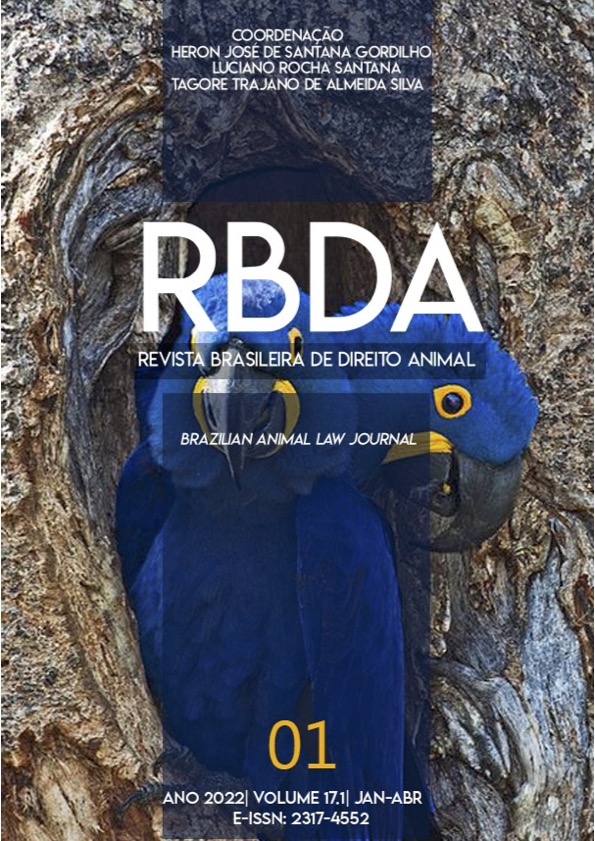Animal Dignity in the justification of animal rights
DOI:
https://doi.org/10.9771/rbda.v17i1.36832Keywords:
Animal dignity; Animal rights; SentienceAbstract
This article approaches the consistency of the idea of dignity in the justification of animal rights. Because of Kant´s theory, dignity is regarded as solely applied to human beings, due to their rationality and autonomy. Can dignity be applied also to other animals? This work will show how four animal ethics philosophers have tackled this problem: Peter Singer, Tom Regan, Gary Francione and Christine Korsgaard. We will see how sentience is the basis to equal consideration of interests between human beings and other animals, without ascribing rights to animals, in Singer´s theory. Regan´s theory, on the other hand, is grounded on the notion that animals should have rights because they are subjects of a life. Francione deems this criterion unclear and restrictive. He claims that sentience should entail inviolability. In order to render inviolable all sentient animals and to prevent that they be regarded as property, Francione argues that sentient animals should be persons. Korsgaard agrees that sentience is the basis for considering animals as subjects of right and adds that they are ends in themselves because of sentience. In contrast to humans beings, though, animals are ends in themselves in a passive sense, which does not prevent that dignity be attributed to them. Korsgaard´s reinterpretation of Kantian theory allows for the link between sentience and dignity. Thus, animal dignity can be a philosophically sound basis for animal rights.
Downloads
References
BENTHAM, Jeremy. An Introduction to the Principles of Morals and Legislation. Oxford: University Press, 1996.
BENTHAM, Jeremy. "Anarchichal Fallacies, Being an Examination of the Declaration of Rights Issued During the French Revolution". In The Works of Jeremy Bentham. Edinburgh: William Tait, 1843, v. 2.
BRASIL. Senado Federal. Projeto de Lei sobre o status jurídico dos animais. Projeto de Lei da Câmara nº 27/2018. In <https://legis.senado.leg.br/sdleg-getter/documento?dm=7987790&ts=1574367803486&disposition=inline>, acesso em 22 abr 2020. Redação aprovada pelo Senado Federal em 07 ago 2019, encaminhada à Câmara dos Deputados, conforme Diário do Senado Federal de 08 ago 2019, p. 105-122, in <https://legis.senado.leg.br/diarios/ver/101561?sequencia=122>, acesso em 22 abr 2020.
BRASIL. Supremo Tribunal Federal. Acórdão de decisão julgou inconstitucional lei estadual sobre vaquejada. ADI nº 4983-CE. Rel. Min. Marco Aurélio. DJE nº 87, 26 abr 2017. Acórdão e votos em <http://portal.stf.jus.br/processos/downloadPeca.asp?id=311683661&ext=.pdf>. Acesso em 24 nov 2021.
COHEN, Carl e REGAN, Tom. The Animal Rights Debate. Lanham: Rowman, 2001.
BROOM, Donald. Sentience and Animal Welfare. Oxfordshire: Cabi, 2014.
COMPARATO, Fábio Konder. A Afirmação Histórica dos Direitos Humanos. São Paulo: Saraiva, 1999.
DARWIN, Charles. The Descent of Man. In WISE, Al (ed.). Charles Darwin Collection. Annotated Classics, 2013.
FELIPE, Sonia T. Por Uma Questão de Princípios: Alcance e Limites da Ética de Peter Singer em Defesa dos Animais. Florianópolis: Boiteux, 2003.
FENSTERSEIFER, Tiago e SARLET, Ingo Wolfgang. Direito Constitucional Ecológico. 7ª ed. São Paulo: RT, 2021.
FRANCIONE. "Animals: property or persons?". In NUSSBAUM, Martha e SUNSTEIN, Cass (orgs.). Animal Rights: Current Debates and New Directions. New York: Oxford University Press, 2004.
FRANCIONE, Gary. Introdução aos Direitos Animais. Campinas: Unicamp, 2013.
FREIRE, Pedro Henrique de S. G.. ”Dignidade humana e dignidade animal”. In Revista Brasileira de Direito Animal, Salvador, BA, v. 7, n. 11, ISSN: 1809-9092, dez.2012, p. 59-77. DOI: <https://doi.org/10.9771/rbda.v7i11.8416>.
KANT, Immanuel. Fundamentação da Metafísica dos Costumes. Lisboa: Ed. 70, 2002.
KORSGAARD, Christine. "A Kantian Case for Animal Rights". In MICHEL, Margot et alli (orgs.). Animal Law: Developments and Perspectives in the 21st Century. Zurich: Dike, 2012.
KORSGAARD, Christine. Fellow Creatures: Our Obligations to Other Animals. Oxford: University Press, 2018.
KORSGAARD, Christine. "Kantian Ethics, Animals, and the Law". In Oxford Journal of Legal Studies, v. 33, n. 4, 2013, p. 5. Disponível em < <http://www.people.fas.harvard.edu/~korsgaar/CMK.Hart.Lecture.pdf>, acesso em 06 mai 2020.
LOURENÇO, Daniel Braga. Qual o Valor da Natureza? Uma Introdução à Ética Ambiental. São Paulo: Elefante, 2019.
MONTORO, André Franco. Introdução ao Estudo do Direito. 29ª ed. São Paulo: Revista dos Tribunais, 2011 .
NUSSBAUM, Martha. "Beyond ´Compassion and Humanity´: Justice for Nonhuman Animals". In NUSSBAUM, Martha e SUNSTEIN, Cass (orgs.). Animal Rights: Current Debates and New Directions. New York: Oxford University Press, 2004.
NUSSBAUM, Martha. "The capabilities approach and animal entitlements". In BEAUCHAMP, Tom e FREY, R. The Oxford Handbook of Animal Ethics. Oxford: University Press, 2011.
REGAN, Tom. The Case for Animal Rights. Berkeley: University of California, 2004.
SARLET, Ingo Wolfgang. A Dignidade da Pessoa Humana e Direitos Fundamentais na Constituição Federal de 1988. 4a ed. Porto Alegre: Livraria do Advogado, 2006.
SINGER, Peter. Animal Liberation. New York: Harper, 2009.
SINGER, Peter. Ética Prática. São Paulo: Martins Fontes, 2002.
TRINDADE, Gabriel Garmendia da. Animais como Pessoas: a Abordagem Abolicionista de Gary L. Francione. Jundiaí: Paco, 2014.
Downloads
Published
How to Cite
Issue
Section
License
Copyright (c) 2022 Brazilian Animal Law Journal

This work is licensed under a Creative Commons Attribution-NonCommercial 4.0 International License.
1. Autores mantém os direitos autorais e concedem à revista o direito de primeira publicação, com o trabalho simultaneamente licenciado sob a Licença Creative Commons Atribuição 4.0 Internacional que permite o compartilhamentodo trabalho com reconhecimento da autoria e publicação inicial nesta revista.
2. Autores têm autorização para assumir contratos adicionais separadamente, para distribuição não-exclusiva da versão do trabalho publicada nesta revista (ex.: publicar em repositório institucional ou como capítulo de livro), com reconhecimento de autoria e publicação inicial nesta revista.
3. Autores têm permissão e são estimulados a publicar e distribuir seu trabalho online (ex.: em repositórios institucionais ou na sua página pessoal) a qualquer ponto antes ou durante o processo editorial, já que isso pode gerar alterações produtivas, bem como aumentar o impacto e a citação do trabalho publicado.












